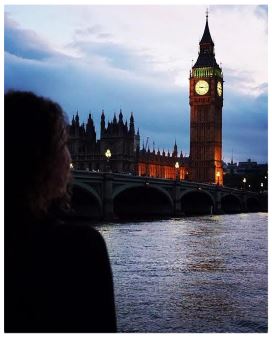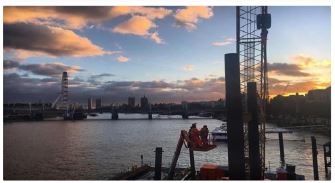
© Heather Phillips, Valencia, CA, USA
by Heather Phillips.
I am a nurse from California, United States. I grew up in Los Angeles and went to nursing school in San Diego. I always knew that I wanted to live and work abroad for a period of my young adulthood. I chose to work in the UK for several reasons. The first time I visited London as a college student, I absolutely fell in love with this city.
Moving to England seemed like a good opportunity to gain experience in working in a different country and to work for a national healthcare system. Coming from the United States, this was not something I had the chance to do before. Lastly, from a practical standpoint the UK was a good fit as English is my first language and I therefore felt confident in my ability to provide care in their hospitals.
I imagined that from a nursing perspective, things would be quite similar to the way things are done in America. This was not as true as I thought it would be. I also expected that spending 6 months in the UK would be enough time to feel I had really had a full experience of living abroad. However, I found living in London to be quite enjoyable and extended my stay to nearly 3 years.

© Heather Phillips
Organization
The application and registrations process were quite lengthy and tedious at times. However, I felt I had a good guidance from my nursing recruiter throughout the process. If you are coming from a country in which you will be required to have visa sponsorship, going with a recruitment agency is easily the best option for you. They will guide you through every step of the way from getting to the UK, as well as getting settled once you arrive. The whole process took about one year from the time I contacted the nursing recruitment agency to the date I obtained my UK nursing registration.
The visa is not difficult to obtain, it is getting your NMC (Nursing and Midwifery Council) registration that will take the longest. If you are coming from outside the UK or EU (things may change with Brexit), you are required to first take the IELTS (International English Language Testing System). This can be done at any authorized testing center in your home country. The NMC requires a score of 7 or higher in all sections of the exam.
Once you have completed this exam you will have to a take a computerized exam that covers the NMC’s policies and some basic nursing theory. This too can be done in your home country at a delegated testing center. Once you have passed this theory exam, you will then have the green light to submit your application to the NMC. This includes providing ID verification, proof of your education, proof of your home nursing registration, a background check and a physical.

© Heather Phillips
Once the NMC approves your application you become eligible to take the OSCE (Objective Structured Clinical Examination) which can only be done in England. Some prospective nurses choose to fly specifically to the UK to take this exam, fly home and wait for the results. Others like myself who live quite far from the UK, take the exam upon their arrival to the UK to live.
To give an idea of the timeline, I passed the OSCE on my first attempt and was awarded my UK nursing registration in a 5-days’ time. I started work roughly a week later. The OSCE can be quite difficult for those coming from outside the UK as the training is different in every country. However, with a decent amount of studying it is very feasible that you will pass on the first go. If, however, you do not pass, you can resit the exam.
Throughout the process of obtaining your UK nursing registration it is important to stay organized and remain patient. The wait from submitting my application to getting the approval to take the OSCE is what I found the most difficult. It was difficult because moving outside your home country requires quite a bit of planning and it was difficult not to know at what point to give notice of my resignation from work and when to let loved ones know that I would definitely be leaving. However, the NMC is currently changing their process of admitting international applicants to make it easier and quicker than it has been in the past. I have included the link to an article about this.
My stay
I originally worked for a travel nurse agency who helped me find a job in London. I was hired at St Thomas’ hospital in London for my first placement. I later went permanent with the hospital and they both sponsored and paid for my new visa. St Thomas’ hospital is a NHS (National Health System) trust. The location of the hospital is absolutely stunning. It sits right on the Thames River in front of the Palace of Westminster and the London Eye. I worked on a neonatal unit, which is the same type of unit I worked in at home in California.
My orientation was very short as I was originally brought in as temporary staff. I only had half of a day with a nurse educator and one full 12.5-hour shift shadowing one of the staff nurses. I did find it a bit difficult at first to acclimate to the unit. The main reason for this is the fact that many terms that we use in the United States for conditions, equipment and medications are different from those used in the UK. I was lucky enough that the hospital had quite a few nurses from North America and that one of them was kind enough to give me a “UK nursing dictionary for Americans” that she had created for herself when she first moved to England.

© Heather Phillips
The hierarchy of the nurses was also quite different from what it is like in America. In America, we have floor nurses, charge nurses and nurse managers. However, in the UK they use a system of banding. A Band 5 is an entry level nurse. A Band 6 is an experienced nurse and likely to be in charge from time to time and a Band 7 is a “sister” and likely to be in charge every shift they work. There are pay increments with each banding. I was treated as a Band 5 nurse, however being temporary staff, my pay was that of a Band 6.
I worked 12.5-hour shifts, both days (07:30-20:00) and nights (19:30-08:00). Full time employment is 13 shifts in 4 weeks. On my unit we were able to request what we wanted our schedule to look like each month; this was a blessing as many units use temporary staff as fillers for the shifts they are short permanent staff. There were many weeks where I worked days and nights in the same week. I found this to be one of the most difficult aspects of the job.
I was allocated 2-3 patients a shift depending on the patients’ acuity and the number of nurses on duty. Staffing on my unit was under control most days, however there were quite a few days when we were short. From speaking to other nurses in the UK, being short staffed seems to be a common problem throughout the NHS.
My duties as a nurse included completing full head to toe assessments, administering medications and blood products, provided basic cares and documenting. As temporary staff I was not offered continued training, however if an international nurse chose to go permanent and work for the hospital directly, they
would be able to continue their training with things like a mentorship course or long line placement training.
The equipment in the hospital was a mix of old and new. To give a few examples, the machines used for patient respiratory support were up to date with new hospitals in the United States. However, gavage feeds were done by gravity as there were no feeding pumps. When I left the unit in late 2017, they were just transitioning from paper documentation to electronic charting.
Aside from securing a job there were many other important things to sort out in my move to the UK. As an American I was required to pay a health surcharge fee alongside my visa fee. This allowed to have the same national health insurance that UK residents have. However, it is important to mention that national health insurance does not include vision or dental coverage. The NHS does provide a pension plan for its employees. However, since I knew I would not be in the UK permanently, I chose to opt out.
To protect myself and my nursing license I obtained malpractice insurance by the Royal College of Nursing. I found the Royal College of Nursing to be a great resource during my time in the UK. They will not only help you should something go wrong, but also provide you with career support and educational materials. As with anything in life there are positives and negatives. The worst bit about my experience of working and living in the UK was dealing with the staffing agency I originally chose to go with. They are still around but are now operating on a much smaller scale.
They lost their ability to sponsor international nurses’ visas in December 2017. Luckily, I was able to extend my stay in the UK by replacing my sponsorship directly with St Thomas hospital. The Kate Cowhig Recruitment agency has been used by a few of my friends and they have all found them to be a great employer and resource! With that being said, do your research and consider going permanent with a hospital if you plan to stay in the UK beyond a short stay.
I have been back in California for a few months now and can confidently say that I do not regret any of my time spent in the UK. I have grown professionally and personally in ways I never imagined. I have created countless memories and meaningful new friendships. Because of those friendships, London has become a second home for me and somewhere I intend on visiting for many years to come.
Important questions and facts
• Which country are you coming from? Will you need visa sponsorship? Some countries such as Canada, New Zealand and Australia do not require sponsorship.
• How long do you plan to stay in the UK? You can apply for citizenship after 5 years of residency.
• All workers in the United Kingdom are entitled to 5.6 weeks of vacation time a year. What will you do with your time off? What are your travel goals? It is wise to save up some money before moving abroad to ensure you can do all you set out to!
• Pay within the NHS is based on your banding
• Private hospitals and clinics pay more than the NHS
Useful British Nursing Terms for North American Nurses
| British English | American English |
| Cannula | peripheral IV |
| Consultant | staff doctor |
| Matron | Nurse Manager |
| SHO (Senior House Officer) | Resident |
| Long Line | PICC |
| I’m going for tea | I’m going for a 15-minute break |
Important websites
NMC: Nursing & Midwifery Council;
Updates for NMC overseas applications
NMC is working to streamline the application process for oversea applicants. Have a look to see how this could help you.
RCN: Royal College of Nursing
NHS: National Health Service
KCR: Kate Cowhig Recruitment, an agency that recruits nurses from around the world to work in the UK and Ireland. They will work with you to get you a job and a visa.
The Skimm: American daily news email. They cover important news topics around the world and relay it in a relatable and comical way.
If you have any questions, just write an e-mail.
Here you can download the experience report as PDF file.
Information about working abroad as a medical student or doctor.
Information about working in Great Britain.
Published in GI-Mail 04/2019 (English edition). Sign up for GI-Mail here. 
Tip: More up to date educational events can be found online in the Education Database »medicine & health«.

3 Comments
I love this piece of information. This is very nice. Thanks for posting.
I am very impressed about your eexperience Overseas. I live in the US and am a nurse. I want to go there to work. I don’t know if there is any changes due to the Covid-19 in terms of the administration.
Am really very impressed with this your post about a nurse’s experience in the uk. Am a nurse a well and from Ghana who wants to work in UK.I need Guidance